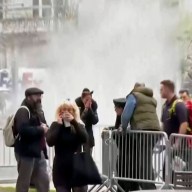By Gram Slattery
BUENOS AIRES (Reuters) – At a recent agricultural fair in Argentina, manufacturers of threshers, tractors and harvesting combines did so well that some encountered an unusual problem in an economy hit by recession and high inflation — excess demand. “We’ve sold much better than we thought we would, but the thing is we were planning too small,” Marcos Formica, an engineer representing manufacturer Mainero, told Reuters at the fair, known as La Rural, late last month. “We were planning to sell a few machines, and we sold much more. We’ve lost some sales because we didn’t have the stock,” he said, adding that Mainero now plans to start producing machinery two months ahead of schedule for the coming season. Sales of agricultural machinery – a useful leading indicator for the farm sector – jumped to 3,004 units in the first half of this year, up 7 percent from the same period last year, government data shows. Despite plenty of gloom about Argentina’s economy, there are signs of green shoots in other areas of the economy as well.
A recent improvement in consumer confidence suggests some Argentines are expecting a recovery under President Mauricio Macri, who has pushed through a series of pro-business reforms since taking office in December after 12 years of interventionist, left-wing rule. By sharply devaluing the peso, loosening price controls and hiking utility rates, Macri’s center-right government has so far failed to rein in inflation or ease the plight of the poor.
But developers say demand is heating up in the high-end commercial and residential real estate markets, and the number of construction permits taken out in terms of square footage has been rising recently. Billionaire investor Eduardo Costantini told a Reuters Summit on Argentina this week he is eyeing a 100,000 square meter mega-plot in Buenos Aires.
Salaries have gone up as much as 35 percent in real terms for top-flight wealth-management experts over the past few months as banks try to lure back Argentines who long ago moved to global financial centers such as New York and London, said Nicolas Rocha, an executive manager at headhunter Michael Page. Macri says Argentina is starting to see an increase in investment that will bring the economic turnaround he has promised, especially as inflation comes under control.
“That will generate stability to strengthen the investment process, which is what will generate jobs,” Macri said in an interview as part of the Reuters Summit at the Casa Rosada presidential palace. He said he expects the economy to grow 3.5 percent in 2017 and was particularly enthusiastic about Argentina’s farm sector, a world powerhouse in soy, corn and wheat production.
Farm investment was already surging and would lead to increases of between 25 and 40 percent in the next crop cycle, Macri said. “It is a very big productive leap.”
‘INVESTMENT TAKES TIME’
Still, government data shows important parts of the Argentine economy are still mired in crisis.
The International Monetary Fund and private economists forecast a more than 1 percent economic contraction this year.
Manufacturing output was down 6.4 percent in June versus the same month last year, after a 4.5 percent fall in May. Construction was down 19.6 percent in June, and 12.9 percent in May, year on year. Consumer prices rose 3.1 percent in June and 4.2 percent in May. The government says monthly inflation will fall steadily but economists still forecast annualized inflation rate will end 2016 at around 40 percent. Facundo Gomez Minujin, executive director at JP Morgan’s Argentina unit, said Macri’s government is taking the right measures but that new investment and economic recovery could be slower than it expects. “There’s a lot of interest in investing in the country but real investment always takes time, in any country, because it is a very long process,” he told the Reuters Summit.
Some Argentines are losing patience and have taken to the streets to protest increases in home heating bills that came as a consequence of Macri reducing energy subsidies.
The number of people lining up at Buenos Aires free soup kitchens has doubled since the start of the year.
In the working class Buenos Aires neighborhood of La Boca, many residents say a combination of rising prices and the removal of electricity subsidies by Macri’s government has put them into an impossible bind. “It’s bad, a disaster,” said Eduardo Jovanian, a middle-aged shopkeeper. “And it’s hard to be positive, because utilities have gone up a lot, and people don’t have the money to pay.” (Additional reporting by Hugh Bronstein, Walter Bianchi and Nicolas Misculin; Editing by Kieran Murray and Tom Brown)
















